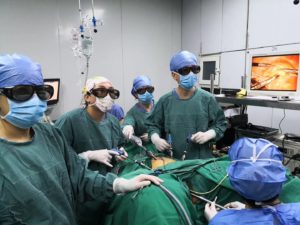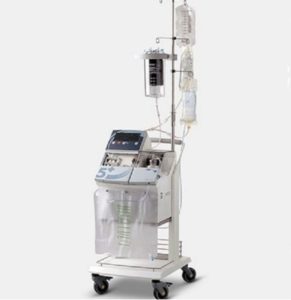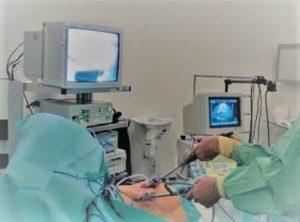Overview
Antai hospital uses a 3D hysteroscopy to diagnose and remove uterine fibroids on the middle and the outermost layer of the uterus wall to stop recurrent miscarriages. The middle layer is called the myometrium, and fibroids grown on it are intramural fibroids. The outermost layer is called the perimetrium, and fibroids grown on it are subserous fibroids.
Having intramural and subserous fibroids during pregnancy will lead to a threatened miscarriage because the fibroids impede uterine blood flow. They also compete for nutrients and space with the embryo. All these will lead to the underdevelopment of the embryo. Hence, the more and the closer the fibroids are to the uterine cavity, the higher the chance of miscarriage.
Symptoms
In the first trimester, the biggest tell-tale sign of intramural or subserous fibroids is slow-rising hCG levels, despite having normal progesterone levels. You will notice that your hCG level is not doubling every three days like it is supposed to.
Low hCG, vaginal bleeding, and abdominal pain are signs that you are having a threatened miscarriage, and an inevitable miscarriage will occur if treatment is unavailable. However, even if the woman does not miscarry, there is a good chance for the baby to have some form of deformity or health-related issues due to underdevelopment and undernutrition.
Our Treatment
For pregnant women, undergoing laparoscopic surgery for fibroid removal is only limited to singular, large subserous fibroids because it only competes for space but does not compete for nutrients and blood from the embryo.
The video above is the story of a patient from Antai hospital. 10 years ago, she had a large subserous fibroid that was successfully removed at Antai hospital. Click here to read more testimonials.
Unfortunately, other forms of fibroids cannot be removed while pregnant, and a miscarriage will most likely occur. Please do not be too discouraged because the fibroids can be removed at Antai hospital, and we guarantee that you can have successful and healthy pregnancies afterward.
Antai hospital follows a “441” oath when it comes to fibroids removal for women that are not pregnant:
4 Yesses:
- Yes to operating regardless of size
- Yes to operating regardless of location
- Yes to operating regardless of quantity
- Yes to operating regardless of patient age
4 Nos:
- No hysterectomy
- No blood transfusion
- No relapse
- No abdominal incision
1 always:
- Always remove all fibroids with 3D laparoscopy

3-dimensional laparoscopy
As seen from the photo above, surgeons at Antai hospital were wearing 3D glasses for laparoscopic surgery. Unlike a normal laparoscopy, the 3-dimensional function allows for binocular depth perception, thus providing accurate measurements of the anatomical spaces, enabling the surgeons to carry out the surgery with precision.

Autologous Blood Transfusion Machine
With this machine, patients will not suffer from blood loss because their own lost blood will automatically be recovered and re-infused into the patients.

Laparoscopic ultrasonography
This enables our surgeons to look into the uterus and identify every single fibroid during the operation.
Antai hospital’s philosophy is to protect all uteruses against hysterectomy unless it is cancerous. With our philosophy, technology, and a team of highly-skilled surgeons, we have been able to prevent recurrent miscarriages caused by fibroids that impede uterine blood flow.
Antai hospital specializes in the treatment of recurrent miscarriages, and so far, we have helped over 34,000 couples finally their rainbow baby.